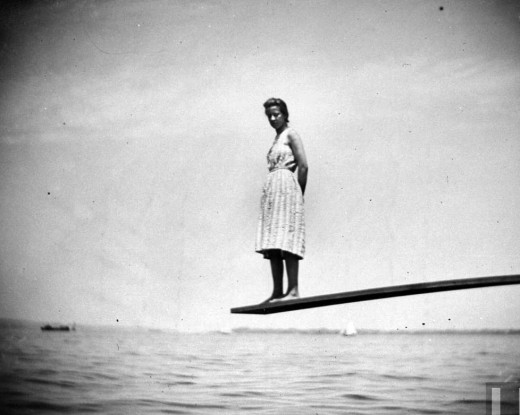Where East Meets West — From Meaningless Words to Self-Love.
{Photo via Vintage Everyday}
By Sze Huei Yek
It’s ironic that I am going to use ‘words’ to argue the merits of actions, but actions, unless captured in video and broadcast widely, is a hidden commodity, whereas words reach a wider audience.
So here it goes:
I am brought up by quiet grandparents that have more actions than words. In fact, the language I spoke growing up with them has no written form.
Later on, my parents, although with somewhat more stringent disciplines, retain the quiet actions-based households that values actions over empty words.
Some examples of my eastern upbringings:
- The word ‘love’ is never spoken, but demonstrated with actions (cooking your favorite dishes).
- You work diligently and quietly, with the wish that your love ones will notice without any need for self-marketing.
- You show your respects and hence love to others by serving. This is especially true while hosting a guest. When one has a guest, you give your best and go out of your way to make your guest comfortable, like giving up your bed, change your daily routine to accommodate your guest, etc.
We showed our obedience by excelling in schools, by conforming to what is expected of you.
The concept of ‘you’ is not that of an individual, it is attached with societal strings and expectations.
How does one recognize that you are in one of the said situations?
Some hints:
- Your loved ones will tell you what you ‘did’ looks good/bad on them.
- They are either proud or disappointed with your achievements, but rarely ‘happy’.
- If you do this/that, you are no longer one of us.
If I had written this last year, I would celebrate and applaud anyone that moved away from the above upbringings, and I will also admit that for the past eight years, I consciously wanted to move away from my early upbringings to a more self-love point of view.
But now, I am not so sure.
I’ve only been in the self-love-centered western society for not that long, but I’d definitely notice that words often do not equal actions.
Words are often sugar-coated, filled with falsehoods, and worst, they are empty — without content or responsibilities.
If there’s a statistical tallying between which societies have a better exercised/developed facial and throat muscles, western society will win hands and feet down.
I am going to give two examples of words where they no longer reflect the actions being conducted.
‘Charity’ — a definitely positive word that imply positive actions, no?
When I hear the word charity, I think of giving something to someone that really needs it. Often, though, in the cases I’d seen, the word charity is, in fact, dumping things that you don’t want anymore on someone that you perceive as of inferior upbringing (hence, needing your junk).
Is giving your 4th TV set to someone who doesn’t have money to pay for electric bills an act of charity?
Is giving the food that you don’t want to eat/about to expire/unhealthy to some starving mother an act of charity?
How is your health more important to the health of the mother-to-be who can’t afford to buy food?
‘Love’ — this is a word that needs no definition.
Everyone knows it, and in western society, everyone uses it, on a daily basis, in many contexts.
This is even said often to the person that you met for the first time, or a complete stranger. It is so widely used, and to such an extent, that it’s a word that does not have any accompanying actions.
I use it all the time, it’s one of my acts of rebellion to move from a non-self upbringing to my self-love journey.
By just mentioning the word love to yourself, to someone else, or a love tattoo on your body (okay, that’s an action) makes you a more loving person?
When the word has no accompanying action, where is the meaning of that word?
Are we truly ready to back up our affirmations of love with actions? Do we really? Ask yourself.
As with everything in life, finding harmony or balance between words and actions is the way that I would like to be, for myself and to others.
Because of my eastern upbringings, even though I try very hard, there are still traces of serving others over myself in my everyday actions, and I am constantly aware of that (something to work on in reflection times).
Western society taught me to see me, and I am still in awe of that wisdom.
That being said, the danger of just me, me, me to the exclusion of others is how inequalities and selfishness arise (more things to work on in reflection times).
There’s no conclusion to this balancing journey, it’s a daily practice, but I can’t help to ponder, if more people are taking actions with their accompanying words, would our world be more equal?
It would certainly be more quiet.
*****
Sze Huei (Zoe) Yek grew up under a stereotypical Chinese tiger mum. Her childhood and most of her young adulthood consisted of long hours of exhaustive and mindless memorization to be at the top of everything she did. To escape the stifling expectations, she daydreamed about parallel worlds where she could fly to wherever she wanted, talk to cats (she still does), and be a heroine with magnificent feats to save humanity. Professionally, she is an Evolutionary Ecologist, specializing in 6-legged creatures commonly known as ants. Personally, she is a social misfit trying to find her footing in the world through travel, Yoga, and all sorts of physical exercises. She received her education from teachers in Southeast Asia, Australia, North America, Scandinavia and is currently residing in Pretoria, South Africa where she continues to pursue and adjust to the socially demanding world.


